- Home
- Lisa Gardner
The Third Victim (Quincy / Rainie) Page 13
The Third Victim (Quincy / Rainie) Read online
Page 13
What she didn’t know, what she genuinely feared, was tomorrow morning at five A.M., when she would drive to Portland to watch the chief medical examiner cut open two little girls.
The thought of it unnerved her. She didn’t want to see Sally and Alice again. Not now, when she knew their names and their families and that they had been best friends from birth. She didn’t want to think of their final walk down that hall or the single cemetery plot that would now hold twin coffins.
Last night, for the first time in over five years, Rainie had dreamed of her mother’s death. The blood and brains on the wall. The smell, the godawful stench of seeping human fluids and fresh gunpowder settling into the carpet. The headless body slumped on the floor, looking so strange and alien Rainie wouldn’t have known it was her mother except for the bottle of Jim Beam still clutched in her lifeless hand.
And as she’d been staring, seventeen years old again, gray matter dripping down onto her hair, Danny O’Grady had come walking out of the kitchen and calmly handed her the smoking shotgun.
“I only did what you wanted done,” he’d said, then exited out her front door.
Rainie had woken up in a cold sweat at four in the morning, shivering uncontrollably. She forced herself to walk into the tiny living area, where the brown carpet and gold-flowered wallpaper had long ago been replaced. She studied every single aspect of the room—new, modern, fourteen years later—and she could’ve sworn she saw blood on the ceiling.
Rainie went back to bed, but she knew from the trembles in her hands when she woke up an hour later that her dreams had still been unkind.
This case was getting to her. She hadn’t expected that after all these years. It frightened her. And it made her mad.
“I want dinner,” she stated abruptly, standing up at the crude desk and beginning to gather her things.
Quincy looked up from his notebook. His expression was mild, but he’d discarded his jacket, rolled up his sleeves, and loosened his burgundy tie. It made him look more approachable. It also emphasized the dark circles beneath his eyes. Apparently, superagent hadn’t been sleeping much even before arriving in Bakersville.
“They have food in this town?” he asked with feigned surprise. “And here I’d thought we skipped lunch out of necessity.”
“Lunch is for sissies,” Rainie said. “Come on. I’ll take you to Martha’s Diner. Best chicken-fried steak in town.”
Quincy raised a skeptical brow, maybe questioning Martha’s claim to fame, maybe already anticipating his arteries hardening. Either way, he grabbed his navy blue jacket and followed.
Martha’s Diner was quiet at this hour. Most working folks had already eaten, and most farmers would soon be in bed. Nothing like several thousand cows to ruin a town’s nightlife. Rainie recognized the credit union’s president, Donald Leyden, eating alone after his divorce. Then Rainie spotted Abe Sanders.
Sitting alone in a corner booth, Sanders was holding his cell phone with one hand while picking at a skinless chicken breast with the other. In between comments on the phone, he chewed raw carrots from a Ziploc bag. Then Rainie noticed the Tupperware container of lettuce. The state detective traveled with salad. If she hadn’t known before, she definitely knew now—Abe Sanders was the Antichrist.
“Yes, I hear the puppy,” he was saying with some exasperation into the cell phone. “No, Sara, you don’t need to put him on the phone. No, no. Hey—” His voice suddenly changed to a higher pitch. “Hi there, Murphy. Yes, you’re a good dog. You’re such a good dog. Now put your mom back on the phone. Really, put your mom—Sara. Sara, there you are. Yeah, yeah, I said hi, but he’s a dog, for chrissakes. He doesn’t understand the modern miracle of AT&T.
“Wait a minute. Is he whimpering now? Why is the puppy whimpering? What happened? What? Really?” Sanders sounded surprised, then sheepishly pleased. “Murphy goes around the house each morning looking for me? He misses me. Huh. I’ll be damned. He really is a smart little guy.”
Sanders finally noticed Rainie and Quincy staring at him.
He sat up quickly, looking caught red-handed, and hastily said good-bye. He was still blushing when he snapped shut his flip phone.
“New puppy,” he muttered. “My wife . . . she’s kind of nuts about the thing. You know how it is.” He swallowed, then nodded toward the empty side of the booth. “Want to have a seat? I got some news.”
Rainie already felt wary, but she slid into the red vinyl booth while introducing Quincy to Sanders. The two had obviously heard of each other, and the handshake was perfunctory.
“So what brings you to Bakersville?” Sanders asked after Quincy blew off Rainie’s suggestion of chicken-fried steak and ordered a Caesar salad. Rainie shook her head to let him know he was making a mistake, then ordered the steak, mashed potatoes, and an extra helping of gravy. She hadn’t eaten all day, and she’d be damned before she was shamed by two men into eating salad. She was still trying to decide if a chocolate malt would be overkill, when Quincy answered.
“I’m researching school shootings for the Behavioral Science Unit. Naturally I’m interested in this case.”
“You’re observing?”
Quincy looked at Rainie. “Something like that.”
“We don’t need federal help,” Sanders said bluntly.
Quincy smiled. “Don’t worry, Detective. I wouldn’t dream of stepping on Officer Conner’s toes by claiming jurisdiction over the case. I hear she has very strong feelings on the subject—and that she’s very good with her sidearm.”
Rainie grinned at the unexpected compliment. San-ders scowled.
“Well,” the state man said briskly, wiping his hands on his napkin, “the whole thing will probably be moot by morning. As a matter of fact, I’m pretty sure I wrapped up the majority of the case today.”
“Really?” Rainie gave him a dubious glance. “And here I thought I’d destroyed the case just this morning.”
“Sometimes the evidence comes together in spite of an officer’s best intentions,” Sanders assured her.
“I’ll remember that. What new evidence?”
“Oh, didn’t I tell you?” Sanders feigned surprise. “Got some info back from ATF today. Tracing Danny’s .38 revolver and .22 semiauto was simple. Both registered to one Shep O’Grady. Furthermore, the CSU recovered five .38-caliber slugs from the area of incidence last night. Today the ME confirmed that blood and fiber on the slugs are consistent with the two juvenile DOAs, and—drum roll here—ballistics determined that rifling on the slugs matches Danny’s revolver. You were right, Conner, we got at least one of the murder weapons.”
“So the .38 was used to kill the two little girls,” Rainie said with a frown. “That still doesn’t prove Danny was the one who pulled the trigger.”
“Yeah, but we also got Danny’s prints on all the casings recovered at the scene. A good lawyer will still argue that only proves Danny loaded the guns, not that he fired them, but at this point the circumstantial evidence is overwhelming. We can tie Danny to the murder weapon. He has no alibi for the time of the shooting, and we have a witness—you—who places him in the school immediately after the shootings, holding his father hostage. Even if we can’t get his confession entered into evidence, I think we have enough for a jury to connect the dots.”
“What about Melissa Avalon? So far, the evidence ties him only to the girls.”
“Don’t know about Avalon yet. It appears she was shot once in the forehead with the .22 semiauto. No exit wound, of course, so we have to wait for the ME to retrieve the slug during tomorrow’s autopsy. Cases like this generally aren’t promising, though. Twenty-two-caliber slugs are only forty grains and made out of soft lead. Most of the time they’re too deformed from ricocheting around the skull to yield any rifling marks. We’ll have to see. On the other hand, I learned some dirt today when I got my hair cut. According to the rumor mill, Avalon and the principal were really tight . . . if you know what I mean.”
“Big deal,” Rainie said.
“Quincy figured that out after a ten-minute chat with the principal. Go, fed.”
Quincy shrugged modestly. Sanders looked chagrined. “You knew he was stepping out on his wife?”
“His reaction to Miss Avalon’s death seemed overly intense for the circumstances.”
“Huh.” Sanders scowled, grabbed a fresh carrot stick, and then recovered. “It doesn’t matter to the investigation,” he said firmly. “I checked with the administrative staff, and Principal VanderZanden was in his office when the shots were fired. From what I can tell, Danny is the only one unaccounted for at the time. Something else to put in our reports.”
“There are still the students who were absent yesterday to consider,” Rainie said.
“Twenty-one students out sick,” Sanders reported. “Sixteen already have alibis in the form of anxious parents. I bet you the other five are cleared by tomorrow afternoon.”
“What about the computers?” Quincy asked. “Principal VanderZanden said Danny spent a great deal of time on-line. I’m curious about that.”
Sanders looked at him shrewdly. “You’re thinking outside influence,” he said.
“It’s been a factor in several of the shootings. And I am surprised by Danny’s sophistication in breaking in to what I would presume to be a state-of-the-art gun safe.”
Sanders grunted. “Don’t know enough yet about the gun safe to determine how hard he had to work to get into it. I do know Shep had a helluva gun collection. We’re lucky Danny went with two small handguns instead of the rifles. God knows what kind of damage he could’ve done then.”
“Do we know why he chose the .38 and .22?” Quincy asked.
Sanders looked at Rainie. She shook her head. “He didn’t comment and I didn’t think to ask. I guess I assumed because they were easier to fit into a backpack. Concealment.”
“But Danny was a hunter, wasn’t he?” Quincy asked.
“Sure. Since he was very young.”
“Did he spend a lot of time with handguns as well?”
Rainie had to think about it. In the meantime, their dinners arrived. Quincy’s salad looked fresh and crisp—the advantage of being in farm country. Rainie’s chicken-fried steak, on the other hand, was smothered in thick gravy, with a pat of butter melting on top. The smell made her stomach growl, but when she picked up her fork, she discovered that the conversation had already destroyed her appetite.
“Shep generally tells hunting stories,” she said after a moment. “I know Danny has some marksmanship awards, but I think they were with a .22 rifle.”
“First place, junior division,” Sanders confirmed. “We seized the trophy from his bedroom.”
Rainie grimaced. She didn’t want to think what it must have been like for Sandy and Shep to watch their son’s room be boxed up by Crime Scene Unit personnel. Or what kind of impression that must have made on Becky.
Quincy was talking. “So Danny’s most comfortable with a rifle but selects two handguns. He has a love-hate relationship with sports but goes after the teacher of the computer lab, whom he supposedly adores. He hides in a room so nobody will see him but never leaves the building after the shooting. Interesting.” He turned to Sanders again. “About the school computers . . .”
“Techies are examining them now,” Sanders said. “Looks like a main computer and three workstations. The school had a firewall server, so the good news is that it probably has a record of which workstation visited which Internet sites at what time. In theory, the lab rats will have a complete rundown for me of all the sites visited by the end of the week. I did get a call this afternoon saying that the computers have been messed with—the cache file purged, the Web browser’s history file deleted, et cetera—so it appears that someone made an effort to cover their tracks. The techies weren’t too concerned. Something about probably being able to find things in the cookies, or God knows what. They were going to start work on it in the morning.”
“If there are any problems, we have excellent recovery agents at the Bureau,” Quincy mentioned casually.
“Yeah, yeah, yeah.” Sanders definitely had no intention of parting with his evidence. He waved his hand dismissively. “I’m sure we’ll be fine. We already got a lot of evidence in place. At this point, the computer stuff will just go to state of mind.”
“We don’t have anything connecting Danny to Melissa Avalon,” Rainie pointed out.
“Then the DA just pursues the charges for killing the girls. That’s fine by me. There are only so many consecutive life sentences a man can serve.”
“A boy can serve,” Rainie said absently, giving up on her dinner altogether and stealing a piece of Quincy’s lettuce. “Only so many consecutive life sentences a boy can serve.”
Sanders rolled his eyes. “Like age has anything to do with it these days. We’re about to be overrun by an entire generation of juvenile psychopaths. Isn’t that right, Quincy? Dual-income families have turned out a batch of superpredators who have no sympathy or remorse. Blast ’em up on Nintendo; blast ’em up on the streets. Murder pregnant women; run home to watch Bugs Bunny on TV. The New York Times ran a whole article on it.”
“I wouldn’t believe everything you read,” Quincy said.
“Why not? I read that article in the early nineties and we’ve had how many school shootings since then?”
“Half a dozen, I’m sure,” Quincy said mildly, “but we still had one of the safest school years on record in 1998.”
Sanders gave Quincy a dubious look. The FBI agent returned it levelly. “In the 1992–1993 school year,” Quincy said, “a time frame I’m sure that article quoted, there were fifty-five fatalities. As you point out, however, this is before we experienced the rash of school shootings. In the 1997–1998 school year, we saw three school shootings. And yet, total fatalities for that year were only forty, nearly a thirty-percent decline. The truth is, violence in schools is a lot like airline crashes—tragic and shocking and headline-grabbing, but by no means indicative of the whole sector. Children are still safer at school—and in planes—than in the family’s minivan.”
“But then again, these incidents aren’t magically going away,” Rainie countered. She stole a crouton from Quincy’s salad and gave him her own version of his hard, direct stare. “In the beginning, maybe you could dismiss this as a phase, but it’s been years now. One shooting is scary. Seven are downright terrifying.”
“We face troubling issues,” Quincy agreed, “but we shouldn’t lose perspective. Overall juvenile criminal offenses have declined in the last five years. And as we’ve cracked down on drugs and gangs, schools have become safer. That’s the good news.
“On the other hand,” he added as he saw their growing skepticism, “some teenagers are shockingly violent and lacking in remorse. And, unfortunately, the media distorts that fact. Normal Boy Kills Ten. Perfect Family Murdered by Fourteen-Year-Old Son. It leads us to rampant paranoia and, if we’re not careful, fear of all children. The truth, however, is that the overwhelming majority of children who commit these shootings aren’t, quote unquote, normal. Several have suffered from recognized mental disorders and were supposed to be on medication. Even the ones who weren’t under a doctor’s care probably had a strong degree of attachment disorder, making it easier for them to contemplate murder.”
“What’s attachment disorder?” Sanders asked.
“It’s the failure to bond,” Rainie said instantly, then shrugged and helped herself to more of Quincy’s salad. “I studied psychology in college. I remember a thing or two.”
“Very good,” Quincy assured her, then frowned and pulled his salad protectively to him. She stole another crouton. He gave up.
“Everyone needs to bond,” Quincy explained to Sanders. “In theory, as children we bond with our parents. We cry, our parents respond to our cry by feeding us, and we decide our parents are good people and love us—we bond. As we grow older, this bond extends to the rest of society, helping us be good friends, neighbors, husbands, et cetera.
Unfortunately, not all children form bonds. The baby cries and is hit. In that case, instead of learning to trust or care about others, the child becomes egocentric, lying compulsively, manipulating others, being incapable of feeling empathy. For the most part, we see this phenomenon in abused or abandoned children. Lack of bonding, however, can happen in ‘good’ households too. It’s just not as common.”
“Good parents have bad kids?” Sanders asked, and rolled his eyes to show his opinion. Quincy wasn’t fazed.
“Absolutely. A mother suffers from severe postpartum depression and is unable to meet her infant’s needs. Or the newborn suffers from a painful medical condition and it’s not in his mother’s power to meet his needs. Or the newborn simply isn’t amenable to bonding. No matter how hard the mother tries, the baby pulls away. It’s rare, but it happens. So yes, good parents can end up with one child who is very social and one child who is very antisocial.”
Sanders gave Quincy another dubious look. “I don’t buy it,” he said bluntly. “You’re saying these kids are little freaking psychopaths from birth. Well, if that’s the case, why doesn’t anyone notice? Why do all the headlines read Normal Boy Kills Ten?”
“Think Ted Bundy,” Rainie offered conversationally. “Everyone thought he was a handsome, charming man. Only problem was that he raped and murdered young girls as a hobby. Oops.”
“Exactly,” Quincy said, and gave her an approving nod. Rainie found herself smiling back. The fed had warm blue eyes when he smiled like that—dazzling, Paul Newman eyes.
“Still sounds like psychobabble to me,” Sanders was harrumphing. “The kids are murderers. End of story. The best solution is to lock them up and throw away the key.”
“Age doesn’t matter?” Quincy asked mildly. He was still looking at Rainie. Belatedly, they both returned their attention to the salad.
“Nope,” Sanders said. “If the kid is capable of doing the act, he’s capable of paying the price.”
Quincy shrugged, obviously less convinced. He stabbed another bite of salad, then surprised both Rainie and Sanders by saying, “Maybe. God knows I’ve seen some things.” He paused. “Some kids are dangerous,” he said finally, more forcefully. “Some of the youths I’ve interviewed probably are beyond all help, let alone our ability to imagine. But not all of them are like that. And our legal system is based on the philosophy that we’d let a hundred guilty men go free before sending one innocent man away. It seems clear to me, then, that we have an obligation to try to identify which youths are amenable to rehabilitation. Not to simply lump all offenders together, then ship them out of sight.”

 Find Her
Find Her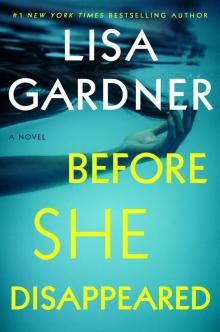 Before She Disappeared
Before She Disappeared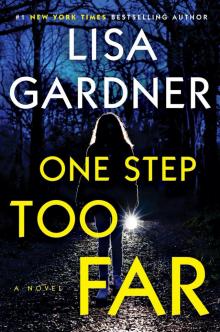 One Step Too Far
One Step Too Far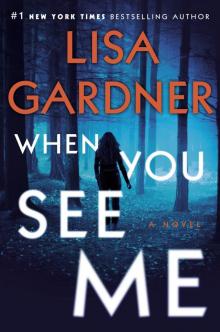 When You See Me
When You See Me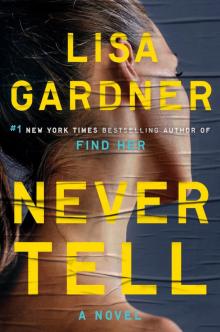 Never Tell
Never Tell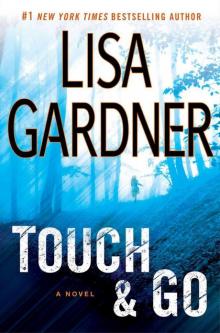 Touch & Go
Touch & Go The Survivors Club
The Survivors Club MacNamara's Woman
MacNamara's Woman Love You More: A Novel
Love You More: A Novel Gone
Gone The Perfect Husband
The Perfect Husband Maggie's Man: A Family Secrets
Maggie's Man: A Family Secrets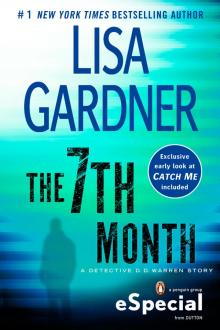 The 7th Month
The 7th Month The Neighbor
The Neighbor Hide
Hide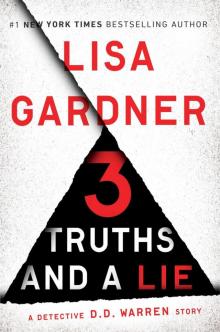 3 Truths and a Lie
3 Truths and a Lie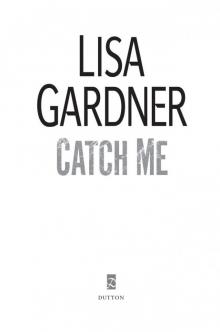 Catch Me
Catch Me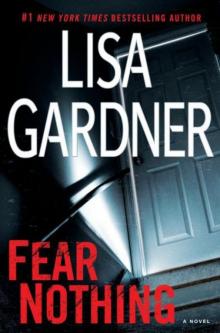 Fear Nothing: A Detective
Fear Nothing: A Detective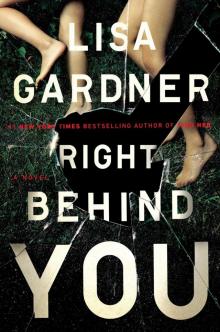 Right Behind You
Right Behind You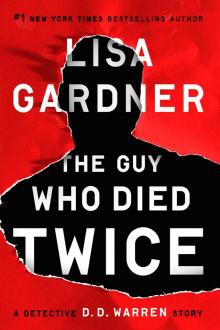 The Guy Who Died Twice
The Guy Who Died Twice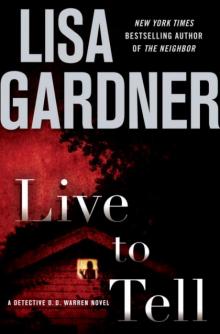 Live to Tell: A Detective D.D. Warren Novel
Live to Tell: A Detective D.D. Warren Novel Live to Tell
Live to Tell Maggie's Man: A Family Secrets Novel
Maggie's Man: A Family Secrets Novel The Other Daughter
The Other Daughter Alone
Alone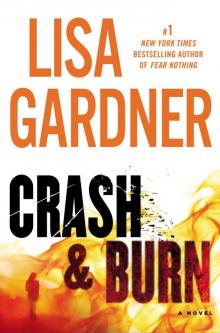 Crash & Burn
Crash & Burn The Detective D. D. Warren Series 5-Book Bundle
The Detective D. D. Warren Series 5-Book Bundle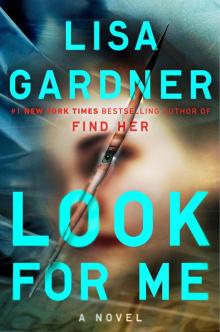 Look for Me
Look for Me Love You More
Love You More The FBI Profiler Series 6-Book Bundle
The FBI Profiler Series 6-Book Bundle The Third Victim (Quincy / Rainie)
The Third Victim (Quincy / Rainie) Say Goodbye
Say Goodbye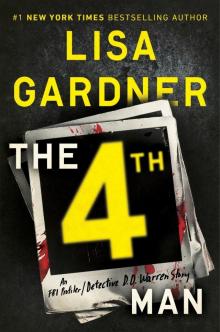 The 4th Man
The 4th Man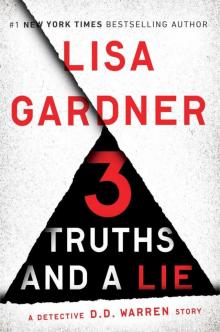 3 Truths and a Lie: A Detective D. D. Warren Story (Kindle Single)
3 Truths and a Lie: A Detective D. D. Warren Story (Kindle Single) Brandon's Bride
Brandon's Bride